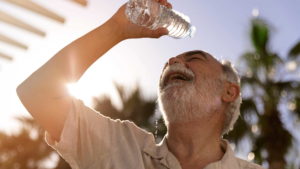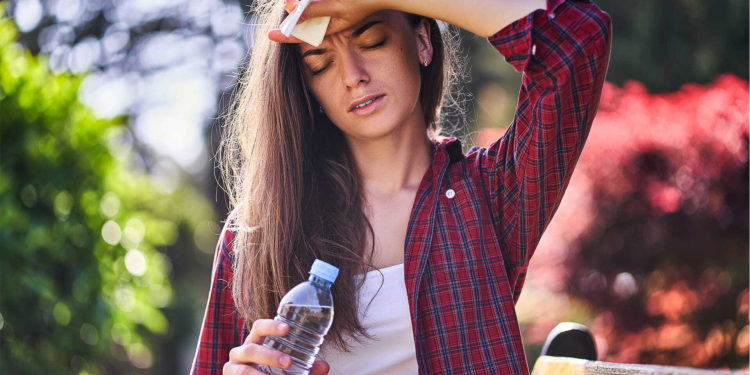Summer brings a lot of fun and enjoyment, but there is a chance of heat exhaustion, sunburn, or heat strokes. You must have heard about the Stay Safe concept and that concept is not just protecting oneself from big dangers but from high heat or too much cold.
It is important to recognize the warning signs and symptoms of such conditions to stay protected and well during disturbing weather. It is important to recognize the signs of what is happening to your body and most importantly how to avoid any threat of heat.
If we simply understand it,
Have you ever spent time in the intense sun and felt overheated and dizzy? If so, it’s possible that you had heat exhaustion. Overheating of the body can lead to complications and you may feel different from normal.
Heat collapse is brought on by a few factors. It can occur by spending too much time in the hot sun, especially if it is really humid. It can also result from intense physical exertion performed in hot weather. If heat exhaustion is not treated on time, it can worsen and develop into heatstroke. The good news is that heat exhaustion can be prevented before it occurs.
Heat exhaustion is one of the heat-related illnesses that happens when your body becomes too hot. It commonly occurs when you are exposed to high temperatures, particularly when there is a lot of humidity in the air, or when you physically exert yourself in the heat.
Furthermore don’t mix that there are three types of heat-related sicknesses: heat cramps, heatstroke, and exhaustion. Heat exhaustion is the mildest. Heat exhaustion can become heatstroke, a potentially fatal condition if it is not treated quickly.
Therefore, never take too much cold and too much heat for granted in life.
The Ultimate Guide to Heat Exhaustion

Heat Fatigue is one of the highly disturbing consequences of heat that comes with symptoms, causes, risk factors, and many more.
Let us thoroughly understand,
Heat exhaustion symptoms
- Severe sweating: Your body attempts to cool off by sweating excessively.
- Fast heartbeat: Your heart beats more quickly than usual.
- Weakness or exhaustion: You can have extreme exhaustion.
- Dizziness or lightheadedness: You can experience a fainting sensation.
- Nausea: Vomiting or feeling ill in your stomach
- Headache: You may be experiencing a mild to severe headache.
- Muscle cramps: You can feel aches or cramps in your muscles.
- Pale skin: You may experience a cold, wet, and pale complexion.
- Even when it’s hot outside, your skin may feel clammy and cold to the touch.
- Seizures: In extreme circumstances, you can pass out or faint.
An important thing to note is these symptoms can appear suddenly, particularly if you are engaging in intense physical activity in the heat. To stop heat exhaustion from getting worse, it is critical to recognize the symptoms and take action to cool down and hydrate your body.
Causes for Heat Exhaustion

There are causes for getting exhausted with heat and one can stay aware to avoid any extreme conditions.
The following are some of the reasons for heat exhaustion:
- Higher temperature, particularly in combination with high levels of humidity
- Excessive exercise in a hot climate
- Dehydration
- Dress yourself in bulky or restrictive clothing that stops sweat from escaping
- Consuming caffeine or stuff, which can cause dehydration
How to Avoid Heat Exhaustion?

Fortunately, by taking the right safety measures, high-temperature exhaustion can be avoided. The following advice can help you in avoiding exhaustion from heat:
Drink a lot of water to stay hydrated, even if you don’t feel thirsty.
Keep your distance from the hottest part of the day which is usually from 10 a.m. to 4 p.m.
Try to be inside or in the shade.
Put on loose-fitting, light clothing. Wearing airy, light-colored clothing made of cotton or other breathable materials will help you stay cool.
Take regular breaks in the shade or inside to cool off if you are working out or working outside.
Use fans or air conditioning to stay cool if your home isn’t air-conditioned
Avoid caffeine or stuff that can cause dehydration, which increases your risk of heat exhaustion.
How to Handle Heat Exhaustion?

- Cooling down and rehydrating yourself or someone else experiencing signs of heat exhaustion is vital. What you can do is as follows:
- Go somewhere cooler. Step away from the sun and move into a covered or air-conditioned space.
- Refresh yourself with a cool bath, shower, or sponge bath, or use cool wrappings on your skin.
- Until you feel better, lie down and take some rest.
When to Get Medical Assistance?
When things are getting out of your control, you should get medical assistance. Furthermore, Heatstroke is a more serious condition that can develop from heat exhaustion and is considered a medical emergency. Seek emergency medical attention if:
After taking steps to cool down and rehydrate, the symptoms either get worse or don’t get better.
Your fever is 40°C (104°F) or higher.
You become confused, disorganized, or lose consciousness.












